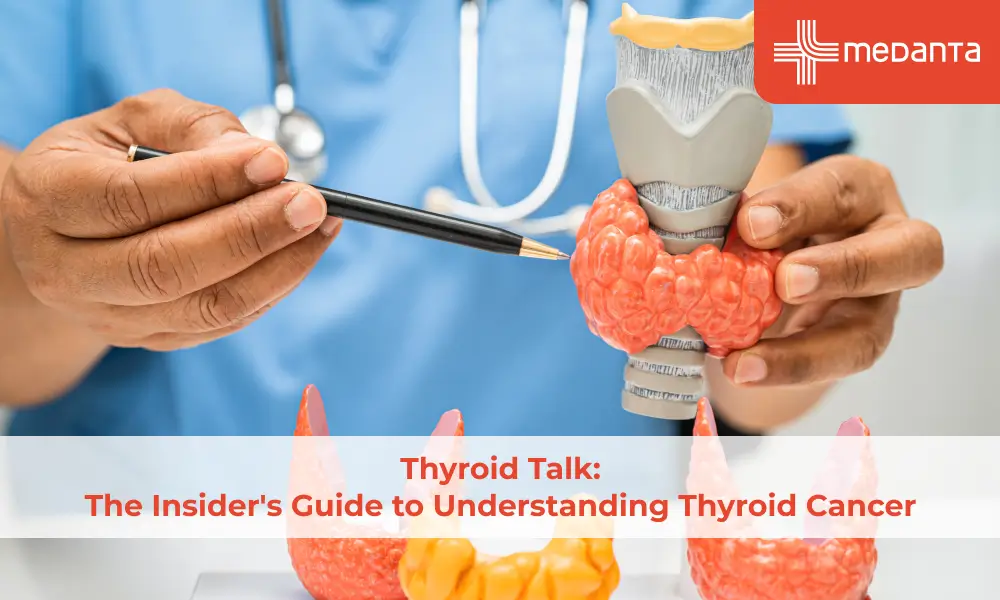Thyroid Talk: The Insider's Guide to Understanding Thyroid Cancer

TABLE OF CONTENTS
Out of all the diseases that have gained prominence of late, thyroid cancer seems to have topped them all. As per the latest reports, 43,720 new cases of thyroid cancer emerge annually and 2120 deaths occur every year. Thyroid cancer is not something to joke about and needs to be given immediate attention if the goal is to prevent and treat this at the earliest.
In today’s post, that is exactly what we are going to discuss. Read ahead to learn about what is thyroid cancer, what causes it, the thyroid cancer treatment options available, and what you can do to prevent such diseases from occurring.
What Is Thyroid Cancer?
Thyroid cancer occurs within a small gland located towards the base of your neck known as thyroid. This grand is responsible for managing your metabolism, handling your body temperature, heart rate, blood pressure, etc. It is also treatable and comes with an excellent rate of cure that we are going to discuss below.

What Are Thyroid Cancer Symptoms?
While thyroid cancer symptoms like swallowing, breathing difficulty, and hoarseness in your voice, can also lead to sudden weight loss, extreme vomiting, nausea, tiredness, or even loss of appetite.
What are the Different Types of Thyroid Cancer?
There are 5 different types of thyroid cancer. These types are explained in detail below:
Papillary Thyroid Cancer (PTC)
This is easily the most prevalent type of cancer and consists of more than 80% of all cases. It is also a slow-growing disease and needs to be diagnosed among individuals who are in their 30s to 40s.
Standard treatments for this include surgery, radioactive iodine therapy, and hormone replacement, with a favorable prognosis owing to its typically indolent nature.
Follicular Thyroid Cancer (FTC)
This comprises 10-15% of cases and displays a more aggressive behavior compared to PTC. With a propensity to spread to distant organs, FTC is commonly found in individuals over the age of 50. Treatment for FTC mirrors that of PTC, involving surgery, radioactive iodine therapy, and hormone replacement.
Medullary Thyroid Cancer (MTC)
Now this arises from parafollicular cells and accounts for 3-10% of thyroid cancers. It brings in unique challenges due to its hereditary or sporadic nature. Primary treatment for MTC involves surgery, while early detection in hereditary cases is critical through genetic screening.
Anaplastic Thyroid Cancer
Although this disease is rare, it is highly aggressive and usually consists of rapid growth of cancerous cells and other tissues. While treating this is a bit costly, you can get a combination of therapy and surgery in order to treat this successfully. You can also speak to your doctor to find more cost-effective thyroid cancer treatments to handle this at an early stage.
Thyroid Lymphoma
This is an exceedingly rare manifestation, accounting for less than 1% of thyroid malignancies. Recognized by a rapidly enlarging mass, accurate diagnosis is crucial for appropriate management. Treatment of thyroid lymphoma usually involves chemotherapy, with additional considerations for radiation or immunotherapy in specific cases.
Available Treatment Options for Thyroid Cancer
If you detect thyroid cancer in your body, you can consider the following treatments based on doctor’s advice.
Surgery: One of the most common treatments for thyroid cancer is surgery. Here, the surgeon will remove a part of your thyroid gland or the whole gland entirely. However, it will depend on the location or the size of the surgery. The surgeon could also remove lymph nodes nearby where the cells have probably been spread.
Radioiodine therapy: In this type of therapy, you will be swallowing some liquid that contains a healthy dose of iodine which is used in radioiodine scanning. It will help destroy the diseases that are associated with the gland along with cells. Radioiodine therapy is considered to be safe and doesn't require much radiation exposure as well.
Radiation therapy: Radiation plays a crucial role in killing cancer cells and preventing long-term growth. This therapy includes the usage of strong rays of energy that directly affect the tumor site and damage harmful cells. This therapy also includes placing the radioactive seeds within the tumor or around it.
Chemotherapy: Oral chemotherapy kills cancer cells and even prevents the growth of cancer. Those who have thyroid cancer will probably never require chemotherapy. However, it can be recommended if the doctor believes it is necessary.
Targeted therapy: Targeted therapy is a form of cancer treatment that focuses on specific proteins involved in the growth, division, and spread of cancer cells. It plays a central role in precision medicine. As scientific understanding of the genetic mutations and proteins that fuel cancer improves, researchers can develop more precise treatments aimed directly at these targets.
Immunotherapy: Immunotherapy enhances the immune system’s ability to identify cancer cells as harmful or foreign. Once activated, immune cells can target and destroy these cancer cells effectively. This principle forms the core of cancer immunotherapy.
What Can You Do to Prevent Thyroid Cancer?
Following certain precautionary measures is always advisable to avoid thyroid cancer. Few of them are explained below:
Daily Check-Ups: Always ensure that you get regular health check-ups with your doctor and keep track of your health, While there are possibilities of finding abnormalities in an early stage, it is important that you can take immediate action and thyroid care to heal early on.
Iodine Intake: Make sure that you get enough iodine but aren't consuming them excessively. Speak to a healthcare professional to determine the appropriate levels of iodine for your specific needs.
Healthy Diet: Do your best to maintain a balanced and nutritious diet rich in fruits, vegetables, and whole grains. Consider incorporating foods high in antioxidants, such as berries and leafy greens, which may contribute to overall health.
Get Some Generic Counselling: If you have any family history in your lineage or have any other similar health conditions, speak to a doctor. Understanding your factors also plays a massive role in offering surveillance and proactive management as well. So make sure that you get tested early on to detect thyroid cancer at the right time.
Conclusion
Finding out that you are afflicted with thyroid cancer can be a very disheartening piece of news. However, most doctors and healthcare providers offer you the best thyroid care so that you can recover at the earliest. So if you need therapy thyroid cancer treatment or health support, schedule a visit with us today.






